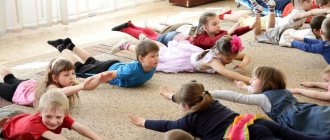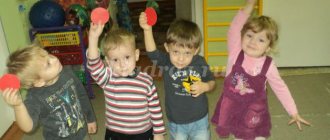Washing
In the sixth year of life, children are taught to independently perform hygiene procedures based on an understanding of their benefits and necessity. A summary of the regime moment “Washing” in the senior group may include the following tasks:
- Formation of the need to wash hands after visiting the toilet, if they are dirty and before eating.
- Consolidating knowledge about various hygiene items (comb, soap, toothbrush, towel, etc.)
- Conveying awareness of the importance of personal hygiene.
- Cultivating a positive attitude towards the washing process.
The teacher uses posters with drawings and short captions, poems, and riddles about hygiene items. He makes sure that the children roll up their sleeves, use soap correctly, do not splash water, turn off the tap, dry themselves with individual towels and hang them up. It is better not to use comparisons with other children. It is more useful to notice the personal progress of each student (“Today you yourself remembered that you need to roll up your sleeves”).
Canteen duty
Setting tables for lunch and cleaning them after meals teaches children to quickly and efficiently carry out important tasks. It is advisable that quick and slow children be paired up, so that they will not return too early from a walk or be late for naptime.
The outline plan for routine moments in the senior group may contain the following tasks:
- Teach children to conscientiously perform their duties.
- Cultivate interest and a positive attitude towards joint work.
- Learn to set the table according to the dishes being served.
- Develop memory and logic.
- Improve communication skills, the ability to negotiate, and act together.
- Learn to evaluate the results of work performed.
First, those on duty wash their hands and put on aprons and scarves. The teacher tells them the lunch menu. Children independently distribute responsibilities, set tables, lay tablecloths, and arrange cutlery. Invention is encouraged (for example, the idea of using flowers for decorations, unusual ways of folding napkins). The teacher can suggest rational methods for performing this or that action.
After lunch, the attendants sweep up the crumbs, remove empty dishes, bread bins and napkin holders from the tables, and fold the tablecloth. The teacher must evaluate the children’s actions and express gratitude to them for their help.
Daytime nap
It takes 2 hours. The outline of the organization of a routine moment in the senior group includes preparation for bed: undressing independently, neatly folding clothes on a high chair, visiting the toilet. The teacher's assistant ventilates the bedroom. Before going to bed, you can read a calm fairy tale to the children or sing a lullaby. Sometimes children fall asleep listening to soft music. The teacher makes sure that the kids lie on their sides and keep their hands on top of the blanket.
They wake up the boys gradually. They are asked to perform simple exercises right in bed (stretching, arm movements, rotation of the feet). Then the children get up, do slight bends, and march in place. Older preschoolers must make their own bed. After this, hardening is usually carried out: walking on massage mats, rubbing with soft mittens. Under the guidance of a teacher, children can perform acupressure massage of the face, ears, and hands.
A summary of routine moments in the senior group helps the teacher plan his work. Thanks to him, everyday activities turn into developmental ones, which enhances their educational effect.
Admission of children
This is where the outline of routine moments begins. With children of the older group, the teacher works to solve the following problems:
- Obtaining information about the health status of pupils.
- Creating a good mood.
- Strengthening hygiene skills in children, including a neat appearance and neatness.
- Formation of polite behavior towards peers and adults.
Older preschoolers usually happily run into the group and share news with their friends. Particular attention should be paid to new students, as well as shy children. If the child is in a bad mood, the teacher should distract him with an interesting activity, a work assignment (watering flowers, wiping leaves).
In the summer, pupils meet outside. Children can be offered games with soap bubbles and pinwheels. At this age, it is recommended to conduct psycho-gymnastics, when children stand in a circle, enjoy the morning together, smile at each other, and say kind words.


